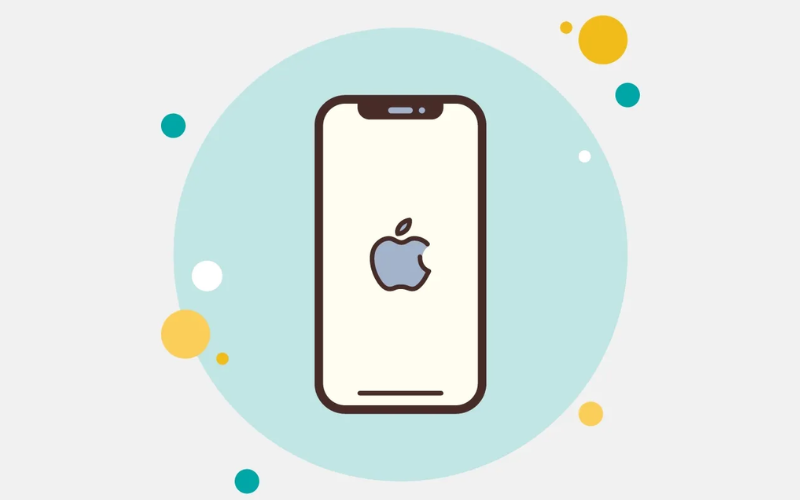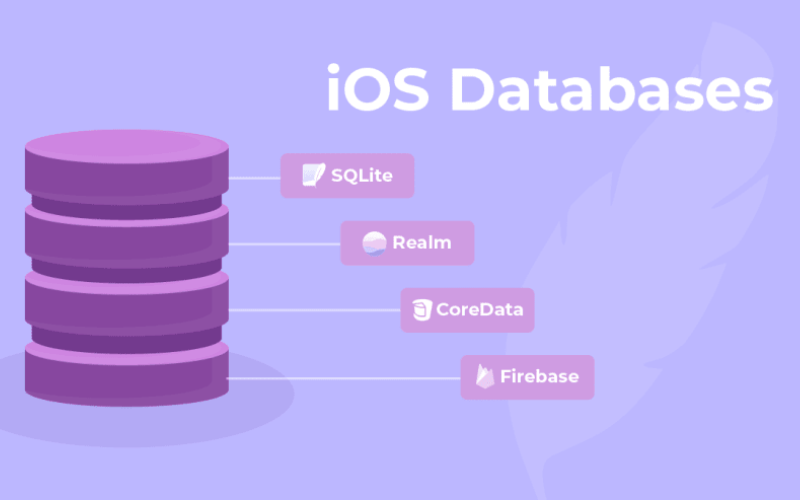Mobile applications have
assimilated into our daily life. Mobile apps have completely changed how we
engage with technology, from placing restaurant orders to handling our
accounts.
Databases are essential for
organizing and storing the enormous volumes of data that run these mobile apps
in the background. Choosing the best iOS database is a crucial decision for app
developers.

This in-depth article's goal
is to help you choose the best database for iOS app by guiding them in making
well-informed decisions.
Why
does database selection affect iOS app development?
The performance, user
experience, and overall success of an app are all influenced by the database
choice.
Let's examine why selecting
the appropriate database is important and the variables that developers must
take into account while making this choice.
Achieving
data consistency
To guarantee that the data
recorded in the database stays correct and current, maintaining data
consistency is crucial. Real-time data changes are frequent in iOS apps because
a database is essential for ensuring that all users receive the same information
at the same time.
In order to avoid any
discrepancies in in-app data and to give consumers a good experience, a
flawless data synchronization procedure should be put in place.
Putting
speed first
The speed at which data is
retrieved and then processed affects how responsive and user-friendly an app
is.
An efficient database can
respond to requests and deliver data quickly, resulting in fluid app
interactions. In contrast, a slow database might cause sluggish app performance
that annoys consumers.
Scalability
The database needs to be
able to grow well in order to handle the increased load when an iOS app becomes
more successful and draws in a larger user base.
Scalability guarantees that
the program will continue to operate effectively and quickly even during
periods of high user activity.
Long-term success depends on
selecting a database that can manage increasing data volumes and concurrent
users.
Security
It becomes increasingly
important for the selected database to scale effectively to handle the demand
as an iOS app grows more well-known and draws more users.
Scalability guarantees that
the program will continue to function well and respond quickly when there is
high user activity.
Data
structure
How well the app can store
and retrieve data depends on the database's data structure.
The database should be
created to meet the specific data requirements and use cases of the app. A
well-structured database speeds up data management, avoids data duplication,
and enhances query efficiency.
Key things to think about when choosing a
database for an iOS app
Choosing the correct
database is important because it can have a big impact on how well an app
performs and how the user interacts with it.
Ease
of use
The simplicity of database
setup, integration, and querying is crucial from the developer's point of view.
A database with an easy-to-use interface and a simple query language can
greatly expedite development and lessen the learning curve for novice programmers.
It will be easier for iOS
developers to choose a database for their apps if they take these important
factors into account.
App developers may produce
highly functional and aesthetically pleasing iOS applications that distinguish
themselves in the crowded app store by choosing the best iOS database that
corresponds with the particular needs and specifications of their application.
Data
modeling
Conducting data modeling is
advised prior to selecting the best database for iOS app. It is a highly potent
expression of the business needs and a representation of the data structures
that will be kept in the database.
If your app has
functionality such as reporting, location-based features, search queries, etc.,
data modeling is a great aid.
Multiple databases are
needed for these programs to handle various kinds of data. Uber, for instance,
makes use of numerous databases, including MongoDB and MySQL.
Performance
Performance is a crucial
factor that directly affects how well a mobile app works. Users may become
frustrated by sluggish app performance caused by slow data retrieval and
processing.
For a seamless and
responsive user experience, using a performance-optimized database is
essential.
When you allow the program
to save and cache both permanent and temporary app data, performance can also
be enhanced. This lowers the number of pointless database calls for data
retrieval.
🔘 Read More: How to Create an iOS App Design That Drives Conversions?
Data
security
Data security is a crucial
consideration throughout choosing the best database for iOS app and the
creation of mobile apps, especially for those that handle user data.
The security mechanisms that
are available to protect user data from access and potential breaches directly
depend on the database option.

The security and integrity
of user data are guaranteed by a secure database with encryption, access
controls, and auditing capabilities.
Flexible authentication
should support the usage of public, private, and customized authentication
sources.
For many apps, support for
anonymous access is also crucial. You'll need support for both file system
encryption as well as data-level encryption for data that is at rest on the
server and client.
Speed
For today's internet users,
speed is a crucial consideration. You can swiftly retrieve and manipulate data
using a faster system.
Choosing the best iOS
database will take some effort, but the outcome is worthwhile. Your users will
benefit from improved functionality and great performance.
Scalability
The database needs to be
able to scale when an iOS app becomes more popular and draws more users in
order to handle the increased load. Even during times of high usage, the
program maintains responsiveness and performance thanks to a scalable database.
Performance of a database is
determined by its scalability. It is essential for a scalable database to be
both fast and performant for data entry and output.
Database solutions that are
read-heavy and write-heavy differ in some ways. And you ought to take this
distinction into account when selecting a database solution.
Offline
support
For apps to provide ongoing
functionality and user input regardless of whether the user is not connected to
the internet, offline support is becoming more and more crucial. To improve the
user experience, offline data access and synchronization must be handled by the
same database management system.
Query
enhancement
Quick data retrieval depends
on effective query processing. Advanced query optimization methods in certain
databases can dramatically reduce query execution times, particularly for
complicated queries.
Most
well-liked databases for developing iOS applications
Choosing the best iOS
database is essential to the development of successful iOS apps. These are a
few of the most widely utilized databases for creating iOS apps.
Core
Data
The Core Data framework is
supported by Apple. Apple's Core Data framework can be used to create data
types and associations, cache temporary app data, and preserve permanent app
data for offline use. Although Core Data can store data using SQLite, it isn't
a database by definition.
An example of middleware
that retains data in a database is a persistence framework. They function as a
sequence of steps between the app and its data stored in the database, hence
the term "abstraction layer" you'll typically hear when referring to
them.
Core Data is a reputable
data conversion and cleaning business that provides a wide range of services.
Core Data can change file formats and fix mistakes in data files.
SQLite
SQLite's simplicity and ease
of use make it a popular choice for creating lightweight apps. Mobile device
optimization is achieved with SQLite, a disk-based relational database
management system. It functions as an independent database engine that doesn't
need a server to be set up.

Applications that don't
require complex server-side processing in addition to data synchronization
requirements are a good fit for SQLite.
The simplicity of SQLite's
implementation is one of the factors that influence some app developers'
decision. Using this database has several advantages, including automatic
syncing and encryption.
It is quick to install, uses
lightweight mobile phone and digital camera integration, is simple to use, and
has straightforward configuration. When you use it, you'll be able to judge for
yourself.
Firebase
Google offers a feature-rich
platform called Firebase. It provides cloud messaging and a real-time database
with hosting.
Firebase is among the best
database for iOS app which is intended to be a turnkey solution that simplifies
the development and scalability of online and mobile applications for
developers.
Many iOS apps, such as those
that require user authentication and cloud messaging, collaborative tools, and
real-time chat apps, can be compatible with Firebase.
In addition, Firebase
provides Cloud Firestore, a scalable and adaptable NoSQL document database with
rich querying features.
🔘 Related: These are common data structures every programmer must know
Realm
Popular mobile database
Realm was created with ease of use and real-time data synchronization
throughout mobile operating systems in mind. This NoSQL database is ideal for
both tiny and large-scale iOS apps, and it performs exceptionally well.
Realm has an object-oriented
architecture, meaning that data is explicitly represented as objects when saved
there. Because the database is integrated inside the app, users may access data
quickly and easily.
IOS apps that need real-time
collaboration, data syncing, and quick data access can use Realm.
Supabase
Supabase, which offers
comparable real-time features and functions to Firebase, is an open-source
substitute. It is built on top of PostgreSQL, a relational database that is
already robust and loaded with features.
Supabase offers PostgreSQL's
strength and flexibility while providing real-time data syncing and
sophisticated data querying capabilities for iOS apps.
In addition, this database
needs less additional server infrastructure compared to other databases such as
Firebase.
Conclusion
Databases are collections of
data, frequently with scripts, applications, and files included. It is what
powers every piece of software.
Making the appropriate
decision for your app's database is essential for smooth performance, data
integrity, and user pleasure.
Given all the options
available today, choosing the best iOS database might be difficult whether you
are creating a brand-new mobile app or want to add more functionality to the
one you already have. The mentioned criteria will help you choose the best
database for iOS app.
Success depends on hiring
the best app developers. We can offer a wealth of knowledge and advice. Contact
us if you have difficulty choosing a database that is right for you.